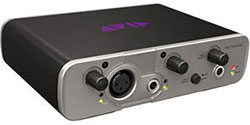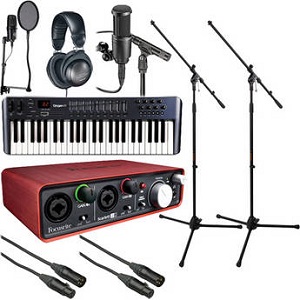
I just saw a video done by Graham Cochrane where he records a rock band one track at a time, using just one mic. I thought is was funny in a way because that’s how I record everything pretty much:). I don’t have a band with me all the time, so I just play all the instruments and sing all the vocals myself (well, my wife and I sing all the vocals frequently). This is simply what you have to do under certain circumstances – be it lack of space, lack of money (for a lot of good gear or studio time), inability to get the band together, you name it.
Because of this, I think this is normal. Actually, in my case I do use two mics (shock! horror!) usually. That’s because on acoustic guitar, I like the sound of the Shure SM81. On vocals I always use a large-diaphragm condenser, usually my Rode NT2-A. But the concept is the same.
One thing Graham does here that I don’t do because I don’t have a drum kit (wife says “no drum kit until we get a house with a basement” – shya). I use virtual drums when I need a full kit. So I really learned something here about recording and entire drum kit at once with only one mic. Graham uses the over-the-shoulder technique with the mic just over the drummer’s right shoulder (for a right-handed drummer). It has several advantages explained by Graham here.
Anyway, the result is pretty awesome. But that didn’t surprise me. My constant harangue is “you can make awesome sounding recordings without expensive gear and without a lot of gear.” You just have to know what you’re doing.
By the way, Graham used the new Avid Fast Track Solo interface, which I am going to review as soon as I get a review copy. Otherwise I’ll have to buy like my 9th interface. Sheesh. Oh well, that’s another story for another day.
Here is the video I mentioned:
 I just read an article entitled “Can Award-Winning Recordings Be Made In A Home Studio?” But before I even read a word of the article, I had my hackles up (a thing my wife says when something gets her quickly in “defensive-mode”). That’s because the title alone made me say “what do you mean by “home studio,” and what awards are you talking about? We (my wife, Lisa Theriot and I) were finalists for an award called a “Voicey Award,” bestowed by
I just read an article entitled “Can Award-Winning Recordings Be Made In A Home Studio?” But before I even read a word of the article, I had my hackles up (a thing my wife says when something gets her quickly in “defensive-mode”). That’s because the title alone made me say “what do you mean by “home studio,” and what awards are you talking about? We (my wife, Lisa Theriot and I) were finalists for an award called a “Voicey Award,” bestowed by 
